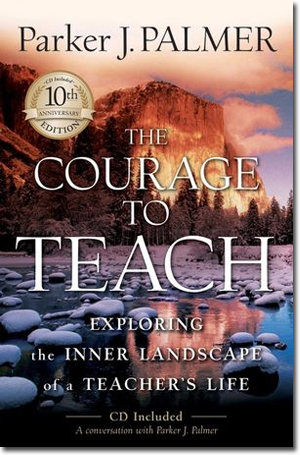
I apologize for not updating my blog as routinely as I should. My goal has been to update it once a week yet this summer I have not developed an efficient daily routine.
I am reviewing Parker J. Palmer's book, "The Courage to Teach." Palmer's intention is to write about the inner life of the teacher. He sticks mainly with theory, using stories to make his ideas become concrete.
Palmer's thesis is an
open reaction to the direction the teaching profession has headed. Like many professions, teaching has become "disconnected," and "we are distanced by a grading system that separates teachers from students, by departments that fragment fields of knowledge, by competition that makes students and teacher alike wary of their peers, and by a bureaucracy that puts faculty and administration at odds." Palmer's thesis is that good teachers need to rid themselves of this "anatomy of fear" and become connected with their selves, have a true identity and authentic self.
He explains how this plays out in the teachers "inner life," in the teacher's relation to the student and in the
community of education.
This review will be offering two positive comments and two criticisms.
Teach from your IdentityPalmer states that teachers are in a unique position because they stand in the intersection of public life and private life.
Good teachers reveal part of their personal identity yet the content they teach is of the public world. In revealing their personal identity, good teachers will teach from who they are. Essentially, Palmer claims that it doesn't matter what technique you use as long as you are teaching from our personal identity. (personal identity: "an evolving nexus where all the forces that constitute my life converge in the mystery of self: my genetic makeup.")
I personally find that it's hard for me to go into a classroom and think, "Okay, I'm going to use this technique at this point and then switch over to this strategy and then use that method." I also find it hard to place myself in any pedagogical "camp." I just teach. Before reading Palmer, I was intellectually beating myself up for not being able to say, "this technique is better then that technique or this is the best method for me to use." My instincts tell me to pull as much as I can from all methods, unless a logical or practical contradiction is created. That's the type of teacher I am. I like a lot of different stuff, all stuck in there in my own pattern. This is who I am as a teacher, and when Palmer said that ultimately it is more important to teach from your personal identity then using a certain technique, I found it comforting. I don't need to place myself in a certain pedagogy camp. If I like something and it fits my need, I'll use it. If it does not, I won't use it.
"The Student from Hell"This is from the title of a section in the book. I really appreciated this section because of two points:
1. "The way we diagnose our students' condition will determine the kind of remedy we offer."
Hence, you need to get to know your students, a really important idea for teachers to apply practically.
2. Find a voice for your students.
I find this harder then the former to put into practice because I like to talk a lot, but it ties in the previous point because in order to help the students find ways to express who they are, what they're thinking and feeling, we need to first get to know them.
Two CriticismsMy first criticism is a broad one. Palmer intentionally avoids giving "tips" or "techniques" and is solely focused on theory. I believe that an idea must have a causal impact on what we do in our lives. When teachers teach, they are doing something. I struggled to conceive of Palmer's ideas in causal way that applied to teaching. Many times he became vague, diving into philosophy, and did not show the impact of his thinking on the classroom. Hence, it seemed there were sections that I was wasting time on because I couldn't see how this applied to how I teach in the classroom. One instance is his critique of "objectivism." Not only was it vague and extremely broad, too broad in my opinion, I struggled to who he was talking about. It would have been very helpful to me if he had applied more of his theory to practice.
One could respond that he used a number of stories. This partially answers my criticism. I greatly appreciated these stories, but if only there were more!
My second criticism is a philosophical one. Palmer argues that "realty is communal." I was confused as to what he was meaning by this. Did he mean truth is discovered/known through community or truth is made through the community. The former is an epistemic statement and the latter is an ontological one. I agree with the former, but have qualms with the latter. I was confused as to what exactly Palm was saying. I would have appreciated more philosophical rigor on this section.
One may say, Dr. Palmer is an educator, not a philosopher. My response: It doesn't matter. He is speaking on very important philosophical issues that have major consequences in how we act and in society at large. In dealing with these matters, clarity is vital.
In conclusion, I enjoyed this book, it was helpful for me as an educator and has expanded my understanding of what it means to be a teacher. I certainly will remember some of the concepts explained and attempt to apply them to the classroom.


